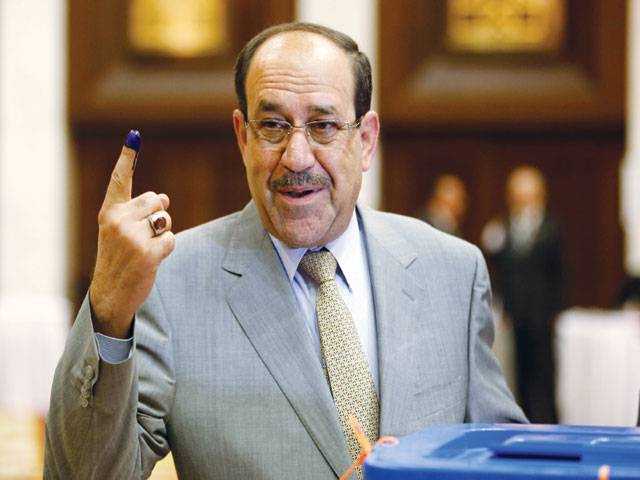BAGHDAD - Iraqis defied a rash of attacks that killed 14 people Wednesday and voted in the first general election since US troops withdrew, with Prime Minister Nuri al-Maliki proclaiming “certain” victory.
Queues formed from early morning at tightly guarded polling stations, and turnout by midday was around 40 percent, according to a diplomatic source.
Polls closed at 6:00 pm (1500 GMT), and the election commission was expected to give overall turnout figures later in the evening.
In Washington, US Secretary of State John Kerry said Iraqis had “courageously voted,” sending “a powerful rebuke to the violent extremists who have tried to thwart the democratic process and sow discord in Iraq and throughout the region.” Iraqis complain of myriad grievances, from poor public services to rampant corruption and high unemployment, but the month-long campaign has hinged on Maliki’s bid for a third term and dramatically deteriorating security.
Maliki encouraged a large turnout and voiced confidence he would stay in power after voting at a VIP polling centre in the Rasheed Hotel in Baghdad’s heavily fortified Green Zone. “Today is a big success, and even better than the last elections, even though there is no foreign soldier on Iraqi soil,” he said.
Maliki called for a move away from national unity governments towards ones of political majority, confidently telling journalists: “Our victory is certain, but we are waiting to see the size of our victory.” The runup to the election, the first parliamentary poll since US forces departed in December 2011, has seen Baghdad and other major cities swamped in posters and bunting. Parties have held rallies and candidates have angrily debated on television, but their appeals have largely been made on sectarian, ethnic or tribal grounds rather than political and social issues.
Analysts had expressed fears much of the electorate would stay at home rather than risk being targeted by militants, who killed nearly 90 people over the two previous days.
And fresh attacks were launched soon after polls opened, killing 14 people and wounding dozens.
Security officials reported more than 50 incidents in all, with mortar fire, roadside bombs and suicide attacks mostly targeting polling stations or people on their way to vote in the north and west.
Among those killed were two election commission employes who died in bombings as they were being escorted by a military convoy in northern Iraq.
Also north of Baghdad, militants seized a polling station and blew it up, after expelling election staff and those waiting to vote.
But many Iraqis said they were determined to vote despite the unrest, voicing disdain for the current crop of elected officials.
- ‘Change for my children’ -
“I came to vote for change for my children and my grandchildren, to change the future and the situation of the country for the better,” said Abu Ashraf, 67, a retired accountant who declined to give his full name.
“It is necessary to change most of the politicians because they have done nothing, and they spend years on private conflicts,” he said after voting in west Baghdad.
Nearby, 19-year-old student Noor Raad said she had voted “to change the politicians, because most of them have not worked to improve the situation.”
Others voiced confidence in Maliki and his government. “If we are not coming to vote, who is going to come (to power)?” asked Umm Jabbar, who had queued since 6:00 am outside a polling station in the city of Najaf. “Will the enemy come? I am voting for Maliki, because he is a thorn in the eyes of the enemy.”
More than 750 people have been killed this month, with violence at its highest levels since a brutal sectarian conflict killed tens of thousands in 2006 and 2007.
Militants have controlled the town of Fallujah since the beginning of the year, preventing polling in parts of mainly Arab Anbar province, west of Baghdad.
Maliki’s critics have accused him of concentrating power and marginalising the minority, and say public services have not sufficiently improved during his eight-year rule.
Saturday, November 23, 2024
PM ‘certain’ of victory as Iraqis vote despite attacks

Caption: PM ‘certain’ of victory as Iraqis vote despite attacks
10:19 AM | November 23, 2024
Baltic states agree on readiness for decisive action against hybrid warfare by unfriendly states
1:28 PM | November 23, 2024
Govt announces massive drop in airfare for Hajj 2025
1:20 PM | November 23, 2024
Shreenidhi Jegadeesan’s role in shaping future of supply chain efficiency
12:57 PM | November 23, 2024
Lahore continues to suffer from smog
12:52 PM | November 23, 2024
Two killed, including policeman, in twin Bajaur blasts
12:48 PM | November 23, 2024
-
Digital nomadism redefines work and travel across the globe
-
Digital nomadism redefines work and travel across the globe
-
Lahore tops global pollution rankings as smog worsens, AQI reaches hazardous levels
-
Hunger crisis to increase in South Sudan, warns UN
-
Pakistan’s judiciary champions climate justice at COP29 in Baku
-
Punjab struggles with persistent smog as Met Office forecast rainfall
Paper Justice
November 23, 2024
No Silver Bullet
November 23, 2024
Reckless Accusations
November 23, 2024
UN Crossroads
November 22, 2024
Smog Trade-off
November 22, 2024
The World: No Longer Livable
November 23, 2024
Unveiling Protein Secrets with AI
November 23, 2024
Outdated Policy
November 23, 2024
Brain Drain
November 23, 2024
Proposal to counter increasing cases of harassment
November 22, 2024
ePaper - Nawaiwaqt
Nawaiwaqt Group | Copyright © 2024





